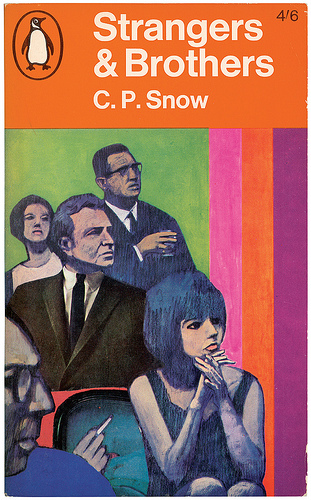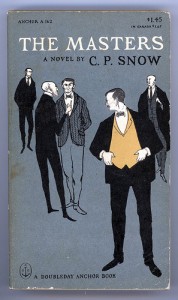There’s a Party at Mona’s Tonight is a collaboration by Harry Allard and James Marshall. Marshall was a prolific, ingenious author-illustrator who deserves an even greater recognition than he has as a titan of children’s literature, and he frequently worked as an illustrator with other writers, including his longtime friend Allard. You may be familiar with their other books — The Stupids, Miss Nelson is Missing, etc, but none hold a candle to this supremely satisfying story of a terrible pig and the party he wants desperately to attend. If you’ve read There’s a Party at Mona’s Tonight — perhaps you are fortunate enough to possess your own copy — this brief celebration of its excellence will be superfluous. But if not, I hope to convince you to make a change in your life.
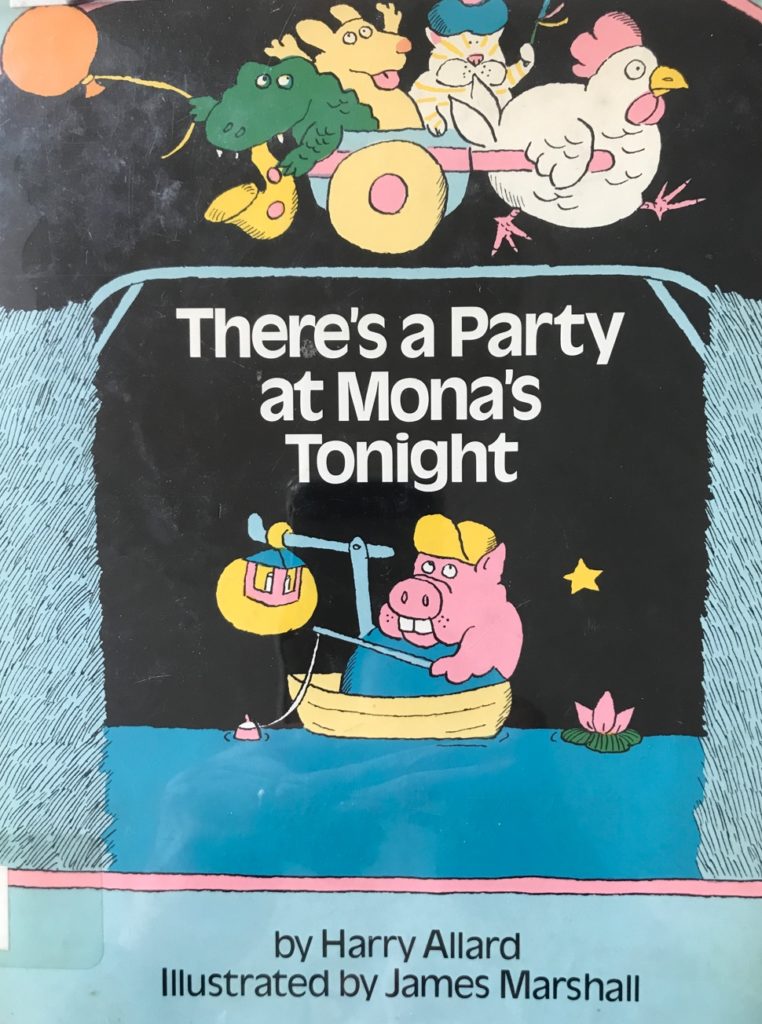
Like all great works of comedy, TAPAMT has a tragic core twisted into irony: Potter cannot remember the offense which has kept him off Mona’s guest list. But his lack of self-knowledge is perfectly balanced by his immense determination to be there.
And it is a party worthy of his desires! We and Potter overhear guests who are so ecstatic about the festivities that one of them (a crocodile holding a saxophone) shouts into the starlit darkness the news that gives the book it’s title. Imagine a party so eagerly anticipated by the guests that they scream the news of it into the night as they travel to the party itself. It’s as if in 1983 I leaned out of the window of a Toyota Corolla to holler “We’re going to Fred’s to get hammered because his mom works nights and won’t be there!”
So Potter races off to the party — and I need to stress here that this party is obviously amazing. As he approaches Mona’s house we can see that there is the same crocodile wearing a party hat and holding a balloon, leaning out of an upstairs window. And when Potter gets to the door, he sees the animals inside having a good time, dancing, blowing on party horns and also wearing party hats — the classic, conical kind.
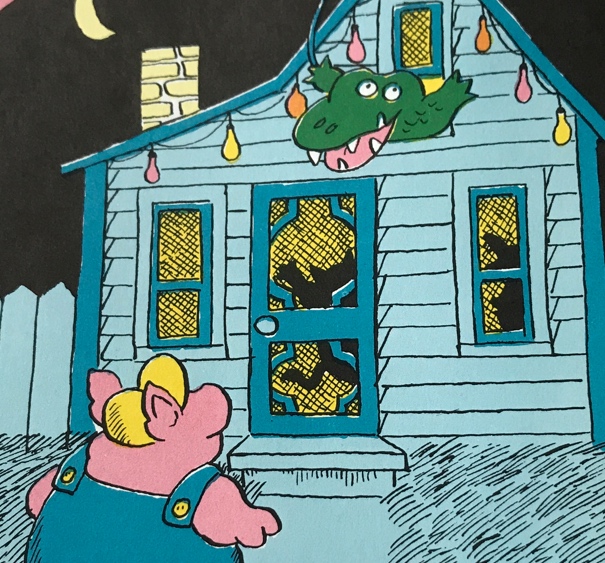
Here’s the thing about party hats: you may dismiss them but if you’re at a party where everyone is wearing them and ALSO gallivanting and having a good time? Commitment to the party.
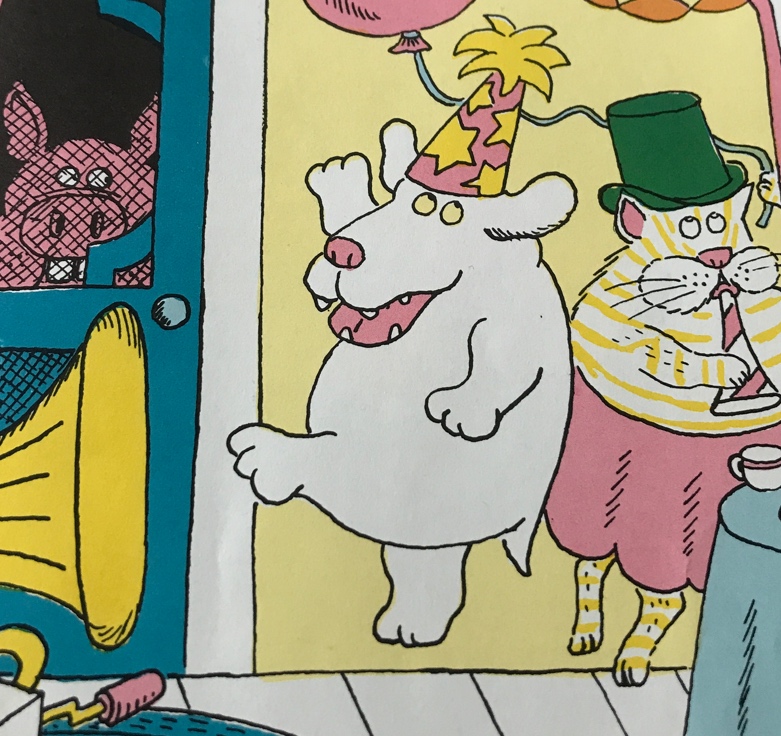
What I’m getting at is this is obviously a world-class party, “everyone” is there, it’s like clearly a signature event of the season, and Potter wants in and frankly we do too.
But before Potter can take us inside, Mona — the Mona of the title, a rat, and also our host — appears at a window and tells our hero in no uncertain terms to get lost. No explanations, just an absolute refusal. “Beat it, Potter!”
So Potter goes home to regroup: he can’t figure out why he’s been banished — P. Pig is not really the introspective type — but he does circle back to (1) he’s definitely the “life” of any party and (2) by “hook or by crook” he’s going to be there.
I want to pause at this critical juncture: we’ve seen, and of course Potter has seen, that this party is already rockin’ like Dokken. Potter’s self-delusion is transparent: the party doesn’t need him. But we, like him, need the party, so we’re on board.
Potter then tries to insinuate himself into the party; tunneling into the basement disguised as a utility worker, hiring a dirigible for a fake-Santa routine and dressing as a statue of a Roman-style figure in a toga, delivered as a gift.
That statue scheme is particularly audacious because once he gets in there, presumably he’s hitting the dance floor, grabbing a drink, whatever: that’s going to blow your statue cover fast, Potter! And yet, again: as a reader, I’m with him. By hook or by crook.
Now, every time Potter attempts to pull the wool over Mona’s eyes with the disguise shenanigans she isn’t fooled for long and I promise you, the sight of Mona rolling her eyes to the heavens at this lame-o nonsense is deeply fulfilling. (I have found the memory of her expression as she uncovers the tunneling-in plan quite sustaining when, for example, in a stressful/insulting customer service situation. )
Each of these scenarios terminates with Potter getting the literal boot: a picture of Mona’s foot and his flying form. If you are reading There’s a Party at Mona’s Tonight to a small child you are going to want to insert, maybe, a sound effect that can be repeated each time this happens.
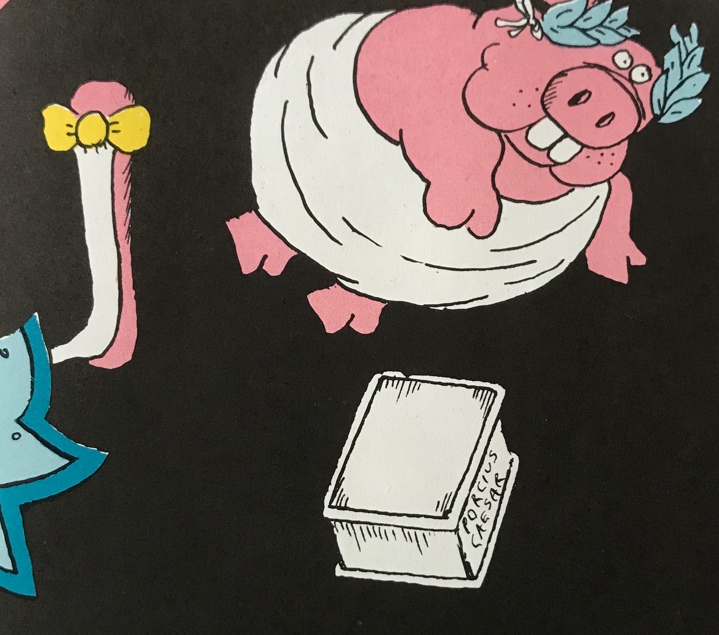
Potter’s frustrations at these repeated ejections-via-butt-kicking at last prompt him to flag down an arriving guest (another! it feels as if things at Mona’s have been going on for hours, what with all of Potter’s repeated costume changes etc).
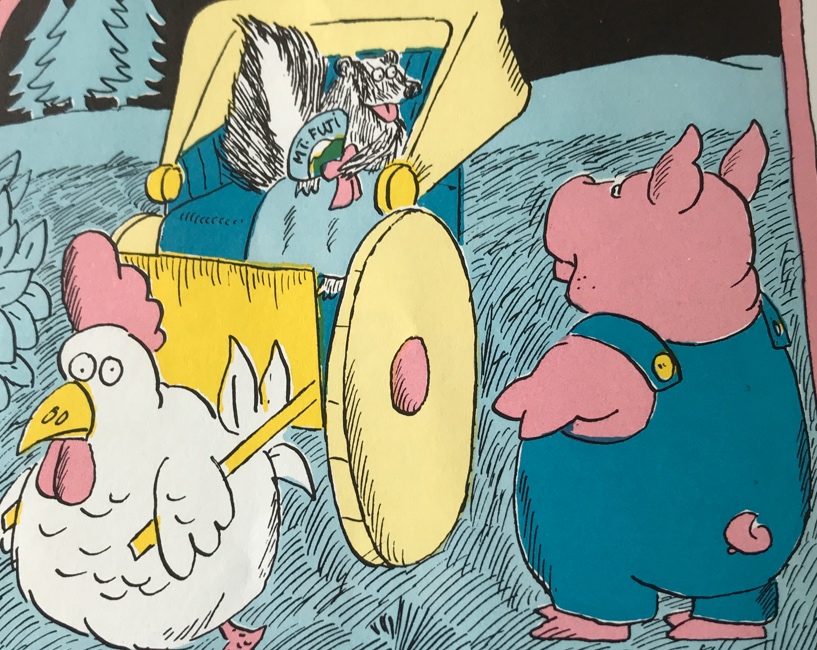
The arriving guest is Blossom Skunk, and she is carrying a Mt. Fuji souvenir fan and that random, wonderful detail causes me to lose my mind a little bit. Blossom, the only person in this narrative who does not seem to be swept away by powerful emotions, sensibly suggests to Potter that he needs to ask Mona herself for an explanation.
Potter phones Mona, and finds out she’s angry with him because he said she has big feet. He swears up and down he didn’t and his denial is IMMEDIATELY ACCEPTED. I suspect it’s just because Mona’s butt-kicking foot got tired, as there’s just no reason to trust this guy.
Potter, having achieved admittance, proves his life-of-the-party-ness: standing atop an ottoman, party hat affixed, his eyes focused on the ceiling in concentration as he croons, his hands clasped in front of him like he’s doing an art song.
He is accompanied by a dog who plays the piano so exuberantly that he lifts his paws up above his head between chords. I like to imagine that Potter has chosen Kurt Weill’s “Alabama Song.”
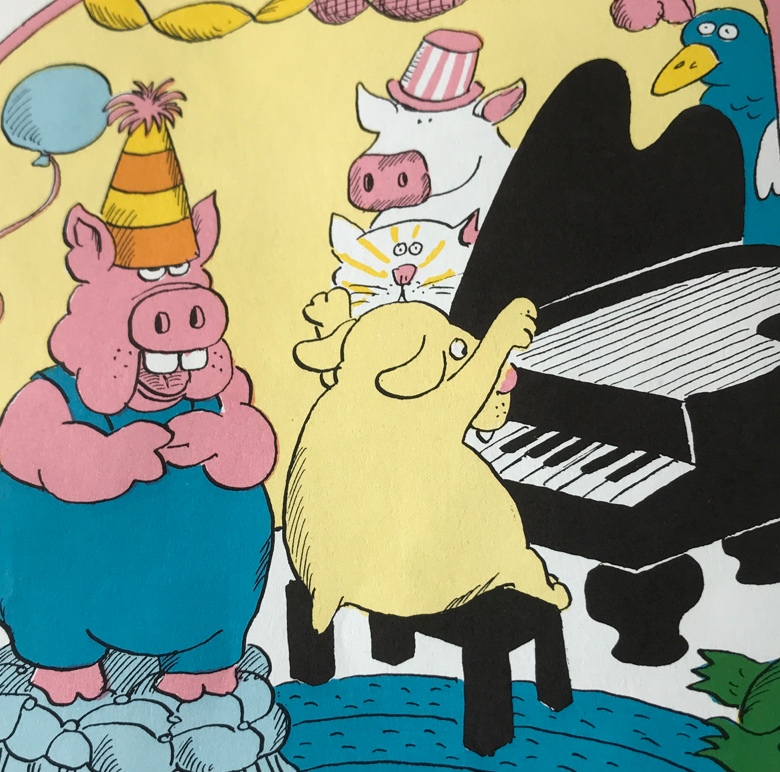
(This is not, of course the end: Potter, predictably lets success go to his head and fucks it all up pretty immediately! The moral, if there is one, is that some people are back on their bullshit mere moments after promising to knock it off.)
But the point is I want to go to this party — or rather I want this party to exist and to always be going on, I want exuberant animals in party hats to be tearing it up through the endless dark night.
And I’d like to know more about Blossom Skunk, and maybe hear about her trip to Japan — I also very much want There’s a Party at Mona’s Tonight to be made into a musical or perhaps an operetta. It could open with the song “Night Fishing.”
There’s a Party at Mona’s Tonight is available used or perhaps via your local library. I hope the unhinged nature of this summary is sufficiently expressive of what you’re missing if you don’t make it a part of your family’s life.


